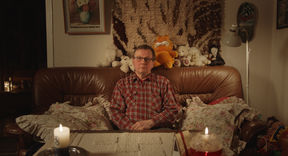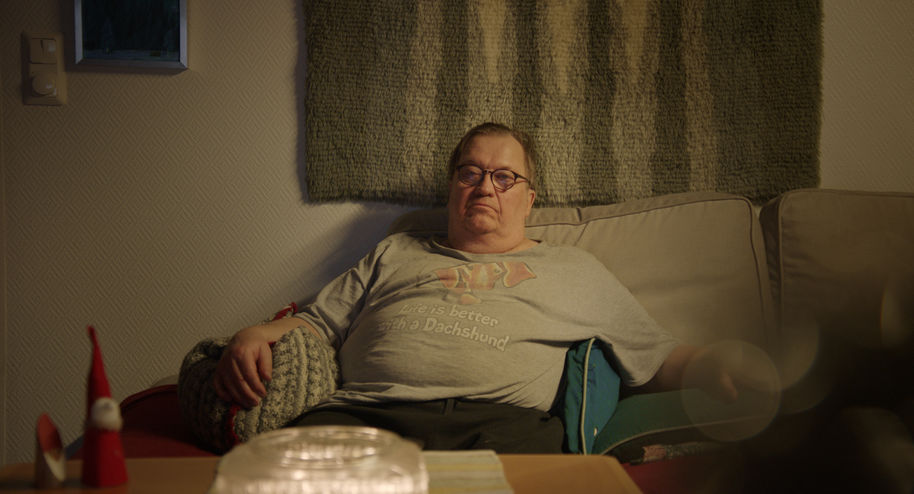The film On Hold speaks for empathy

On Hold (Poikien puhelin), a film by Aalto University's Department of Film, Television and Scenography students has won a Youth Jury Price for most innovative short film at the International Film Festival Nyon – Vision du Réel in Switzerland in May.
The jury reasons the award by“the originality of its cinematographic apparatus, because it deals with various current and important subjects, and for its touching aspect which succeeds in transmitting multiple emotions”.
On Hold is a documentary short film about intergenerationality and socially constructed masculinity. The documentary is based on discussions with the Family Federation of Finland and their phone service Boys’ Phone (Poikien Puhelin), which is an anonymous conversation service for boys and young men under the age of 20.
The film reflects on the attitudes, values, and emotional burdens we inherit from those who preceded us and pass them on to future generations, and makes every child’s need to be heard visible.
Themes that span generations
The origin and idea for the film is practical. Director Laura Rantanen was looking for a summer job in the spring of 2018, and came across a job advertisement for a respondent for the Boys' Phone service. She wondered if a woman could apply for the job as well.
The reply, however, was that only men should act as respondents, as several of the discussions in the service were strongly related to the challenges of growing up as a man and taking over the role requirements of masculinity.
Rantanen thought the idea for the service was interesting, and she suggested collaboration for making a film.
‘The film’s themes on intergenerational emotions and attitudes, as well as socially constructed masculinity, are based on the observations we made of the calls’, she explains.

The aim was to address the theme of intergenerationality through the calls on five different levels: in the film, intergenerational is understood as a spiritual heritage passed down from one generation to the next; to go through and cope with difficult things; the timelessness of certain problems; an ongoing re-building of identity and a national historical project through which certain attitudes and values are repeated and maintained.
‘These themes, however, are just the authors’ goals and reasons for making the film. Each viewer sees the film from his or her own point of view and therefore it opens up differently to different people’, Rantanen reminds.
Older men give their voice for the boys
Rantanen tells the film team had to consider how to best protect the anonymity of the callers in the film. The solution was that the voices of boys and young men calling the conversation service are presented mainly by men over the age of 60.
At the same time, using older performers as faces and voices for the callers is a way to make visible the film’s underlying theme, the intergenerational and historical nature of attitudes, values, and emotions. These men, too, have been young boys with their questions and problems.
The performers are ordinary people, for whom for example memorizing the phone discussions was challenging, and performing in front of the camera required courage, Rantanen tells. Furthermore, the question of how hate speech—that the calls also included—should be presented in the document needed a lot of attention.
‘There was a danger that repeating hate speech would at the same time normalize language that glorified racism, homophobia or violence—and that we did not want to do.’
A documentary with its own voice
The film is the thesis of editor Menni Renvall's master's studies. She was involved in the planning and production of the documentary from the script. The film consists mainly of monologues depicted in a single shot, so her job was to rearrange these scenes, to reflect on the overall dramaturgy of the film and various experiments with archival material.
‘For a final work, this was an absolutely ideal film: a documentary with its own voice and style.’
On Hold is a hybrid film that draws on several different genres of the film as well as ways of watching it. It has numerous audiovisual role models from which the documentary draws its presence.
‘Visions du Réel’s world premiere opened the festival tour for the film and it will be screened at several international film festivals next autumn’, says producer Anna Mellin.
The documentary has been directed by Laura Rantanen, cinematographed by Tomi Rislakki, edited by Menni Renvall, sound designed by Iivo Korhonen and produced by Anna Mellin.
The film has been supported by the City of Espoo Cultural Office and the Finnish Film Foundation with a screenwriting grant. The Visions du Réel festival was held online this year due to the corona situation.
For more information:
Director Laura Rantanen, Department of Film, Television and Scenography, School of Arts, Design and Architecture, tel. +358 44 982 4737, laura.s.rantanen@aalto.fi
Producer Anna Mellin, Department of Film, Television and Scenography, School of Arts, Design and Architecture, anna.mellin@aalto.fi
Read more news

Apply Now: Unite! Visiting Professorships at TU Graz
TU Graz, Austria, invites experienced postdoctoral researchers to apply for two fully funded visiting professorships. The deadline for expressions of interest is 20 February 2026, and the positions will begin on 1 October 2026.
Elina Pyylampi wants to combine renewable energy solutions and commerciality
The first-year student in Electrical Power and Energy Engineering wants to work with renewable energy and electrical systems.






